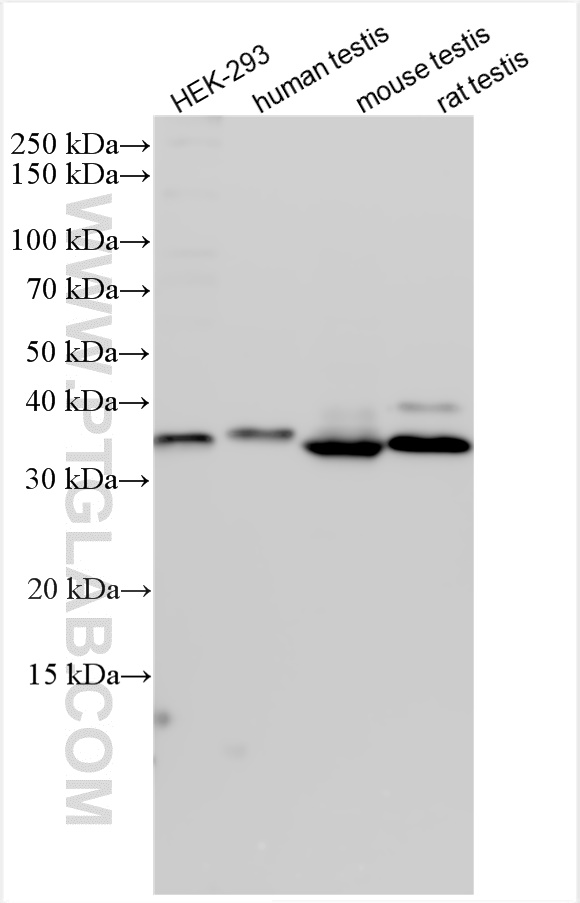验证数据展示
经过测试的应用
| Positive WB detected in | rat testis tissue, human testis tissue, mouse testis tissue |
| Positive IF/ICC detected in | MCF-7 cells |
推荐稀释比
| 应用 | 推荐稀释比 |
|---|---|
| Western Blot (WB) | WB : 1:500-1:1000 |
| Immunofluorescence (IF)/ICC | IF/ICC : 1:300-1:1200 |
| It is recommended that this reagent should be titrated in each testing system to obtain optimal results. | |
| Sample-dependent, Check data in validation data gallery. | |
产品信息
19163-1-AP targets FKBP6 in WB, IF/ICC, ELISA applications and shows reactivity with human, mouse, rat samples.
| 经测试应用 | WB, IF/ICC, ELISA Application Description |
| 经测试反应性 | human, mouse, rat |
| 免疫原 |
CatNo: Ag4642 Product name: Recombinant human FKBP6 protein Source: e coli.-derived, PET28a Tag: 6*His Domain: 4-327 aa of BC036817 Sequence: SALNQGVLEGDDAPGQSLYERLSQRMLDISGDRGVLKDVIREGAGDLVAPDASVLVKYSGYLEHMDRPFDSNYFRKTPRLMKLGEDITLWGMELGLLSMRRGELARFLFKPNYAYGTLGCPPLIPPNTTVLFEIELLDFLDCAESDKFCALSAEQQDQFPLQKVLKVAATEREFGNYLFRQNRFYDAKVRYKRALLLLRRRSAPPEEQHLVEAAKLPVLLNLSFTYLKLDRPTIALCYGEQALIIDQKNAKALFRCGQACLLLTEYQKARDFLVRAQKEQPFNHDINNELKKLASCYRDYVDKEKEMWHRMFAPCGDGSTAGES 种属同源性预测 |
| 宿主/亚型 | Rabbit / IgG |
| 抗体类别 | Polyclonal |
| 产品类型 | Antibody |
| 全称 | FK506 binding protein 6, 36kDa |
| 别名 | 36 kDa FK506-binding protein, FK506-binding protein 6, FKBP36, FKBP-36, FKBP-6 |
| 计算分子量 | 327 aa, 37 kDa |
| 观测分子量 | 36 kDa |
| GenBank蛋白编号 | BC036817 |
| 基因名称 | FKBP6 |
| Gene ID (NCBI) | 8468 |
| RRID | AB_10603363 |
| 偶联类型 | Unconjugated |
| 形式 | Liquid |
| 纯化方式 | Antigen affinity purification |
| UNIPROT ID | O75344 |
| 储存缓冲液 | PBS with 0.02% sodium azide and 50% glycerol, pH 7.3. |
| 储存条件 | Store at -20°C. Stable for one year after shipment. Aliquoting is unnecessary for -20oC storage. |
背景介绍
Inactive peptidyl-prolyl cis-trans isomerase FKBP6 (FKBP6), also known as 36 kDa FK506-binding protein (36 kDa FKBP; FKBP-36), is a member of a gene family that contains a prolyl isomerase/FK506 binding domain and tetratricopeptide protein-protein interaction domains(PMID: 9782077). It has been linked to the secondary piRNA biogenesis in fetal male mouse germ cells ( PMID: 22902560).
实验方案
| Product Specific Protocols | |
|---|---|
| IF protocol for FKBP6 antibody 19163-1-AP | Download protocol |
| WB protocol for FKBP6 antibody 19163-1-AP | Download protocol |
| Standard Protocols | |
|---|---|
| Click here to view our Standard Protocols |



